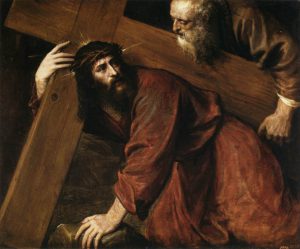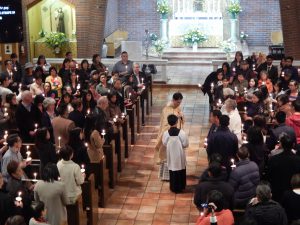Today’s homily will be a first for us, because I’m going to make an appeal for greater financial support of our parish, as we need more full-time staff to support our mission. Some people have encouraged me to give this homily for a while, but I’ve hesitated, for three reasons:
1) When I was growing up, my father accused the Church of focusing too much on money. So, for my whole life, even after becoming a priest, I wanted to avoid offending people and so I avoided talking about money.
2) When I was 16, I volunteered to help out with Project Advance by calling people for donations. That night, after finishing on the phone, I wondered: “Why am I calling to ask for money, and not calling to see how people are doing spiritually?” That’s why last year we tried calling everyone in the parish to see how they’re doing spiritually.
3) I’ve known for two years now that here at St. Anthony’s we/I need more help, but I felt I first had to earn people’s trust. I was also a bit afraid: “What if it goes over really badly? What if it’s misunderstood?”
The reason we’re talking about this today is because the first reading and Gospel speak about humility. Let’s focus on two aspects of humility: dependence and truth.
 1) Did you know that Jesus is actually dependent on the Father (Fr. Roch Kereszty, O.Cist., Jesus Christ, Fundamentals of Christology, 110-11)? Not that He’s lesser than the Father, but because the Father gives Him everything; all that He has comes from the Father. That’s why we say during the Creed, “God from God, light from light, true God from true God.” Today Jesus says, “All things have been handed over to me by my Father” (Mt 11:27).
1) Did you know that Jesus is actually dependent on the Father (Fr. Roch Kereszty, O.Cist., Jesus Christ, Fundamentals of Christology, 110-11)? Not that He’s lesser than the Father, but because the Father gives Him everything; all that He has comes from the Father. That’s why we say during the Creed, “God from God, light from light, true God from true God.” Today Jesus says, “All things have been handed over to me by my Father” (Mt 11:27).
When reflecting on this, I prayed, “Father, I’m going to take a risk by talking about parish finances, but I trust in You. I depend on You for everything. I need your blessing on this weekend’s homily, because people may misinterpret this.”
 One spiritual writer says: “Faith in God assumes a prudent faith in other people” (Fr. Segundo Galilea, Temptation & Discernment, 23). If we have faith in God’s goodness, we should have faith in other people’s goodness. So I’m putting faith also in you today, that you understand me correctly.
One spiritual writer says: “Faith in God assumes a prudent faith in other people” (Fr. Segundo Galilea, Temptation & Discernment, 23). If we have faith in God’s goodness, we should have faith in other people’s goodness. So I’m putting faith also in you today, that you understand me correctly.
2) Humility is about truth. St. Vincent de Paul says, “Humility is nothing but truth.” Knowing this, I said to myself, “If you’re in need, say it.”
 Even Jesus needed help! When He was carrying the Cross up the hill to Calvary, St. Simon of Cyrene was pressed into service to help Him carry His Cross (Mt 27:32; Mk 15:21; Lk 23:26). Now, why did Jesus allow Himself to need help? His divinity could have just given His humanity more strength. Spiritual writers say He did it to remind us that we need help; we need other people to carry our crosses with us.
Even Jesus needed help! When He was carrying the Cross up the hill to Calvary, St. Simon of Cyrene was pressed into service to help Him carry His Cross (Mt 27:32; Mk 15:21; Lk 23:26). Now, why did Jesus allow Himself to need help? His divinity could have just given His humanity more strength. Spiritual writers say He did it to remind us that we need help; we need other people to carry our crosses with us.
The truth is, as a parish, we need help because we’re growing and don’t have enough full-time people to support our ministries and initiatives. There’s only so much part-time volunteers can handle. It’s not realistic to expect part-time or even full-time volunteers to grow something and keep up with it: There are so many people to take care of spiritually that the ministries require more leadership.
I wish I could help each person individually, but I can’t. I need help. Things get bottlenecked with me. All the ministries report to me, all questions come to me, and one expert told me: “Father, you can’t have 26 ministries reporting to you. No organization can run like that.”
For three years, I’ve over-extended myself and others to show you that what we’re doing here is worth it. For example, the ten hours of Confessions every first Saturday is hugely fruitful because there are conversions, moral growth and moral victories; and people have greater opportunities to come. But the time I spend there has to come from somewhere else.
The question I always ask myself is: “How can I help as many people possible, in the best way possible?” It’s not by administration or certain other ministries which trained lay people can do well, because, there’s only one priest/shepherd, and he should be doing what only he can do. That’s why I spend eight to ten hours per week on the Sunday homily, because only I can do it, and it helps 1,050 people—that’s time well spent.
This is what I’m asking today: Would you think about financially giving to the parish every weekend, in a sacrificial way? Sacrificial doesn’t mean unreasonable, but it means there will be a sting. I only ask this because the parish gives in a sacrificial way, I give sacrificially, Deacon Andrew gives sacrificially (he’s taken on much more than ever agreed to) and so many of us give sacrificially. Thank you to everyone who already gives in this way!
I can think of two reasons why we might not yet give sacrificially: 1) We’ve never been asked to. Everything seems to run just fine, so there’s no need; 2) At many churches, honestly speaking, it seems like there’s nothing really worth supporting: It’s the same thing every week; there are no signs of life and growth; there’s no talk about doing more and doing a better job for God (but here there is real growth).
Also, someone once said at a meeting here, “We’re constantly being squeezed to give to this or that charity or need.” While I don’t think this is factually true, as we don’t have many fundraisers here, it does reveal an underlying sentiment that is understandable: Some people feel obliged to give to things they don’t really believe in.
So let’s be clear: I’m not forcing anyone to give. If you don’t believe in what we’re doing here, don’t give! Every choice must be made in freedom—that’s an important spiritual principle. If someone says, “Father, I don’t get nourished here. Nothing good’s happening; nothing’s improving. And there are more important things to support,” then I would say, “That’s fine.”
While I’m not forcing anyone, I am trying to make a case that our parish is worth supporting. We are an incredible community that is growing and I’m asking, “Will you help us improve?” Our mission here is to make disciples for Christ, and lead them to heaven. A disciple is someone who follows in the footsteps of Jesus, imitating Him in such a way as to become like Him.
 The centre piece of our mission is what we do 52 Sundays a year (and on the two holy days of obligation: Dec. 25 and Jan. 1). The whole Sunday Mass is geared towards leading us to encounter Jesus so that we follow Him and become like Him. We try to guarantee that every Sunday you’ll be nourished with a well-prepared, theologically deep, insightful, relevant and practical homily which will console and challenge us in our head and hearts. We try to guarantee that you’ll have a sense of the sacred , a place of silence and prayer (because our world is a noisy world), and a beautiful, comfortable environment. We try to guarantee that our hospitality ministry, with greeters, ushers, and those at the Welcome Booth, will offer the human face of Jesus. The choirs, servers, lectors, gift bearers have improved and do great jobs. I believe we can bring our family and friends here and guarantee a good experience.
The centre piece of our mission is what we do 52 Sundays a year (and on the two holy days of obligation: Dec. 25 and Jan. 1). The whole Sunday Mass is geared towards leading us to encounter Jesus so that we follow Him and become like Him. We try to guarantee that every Sunday you’ll be nourished with a well-prepared, theologically deep, insightful, relevant and practical homily which will console and challenge us in our head and hearts. We try to guarantee that you’ll have a sense of the sacred , a place of silence and prayer (because our world is a noisy world), and a beautiful, comfortable environment. We try to guarantee that our hospitality ministry, with greeters, ushers, and those at the Welcome Booth, will offer the human face of Jesus. The choirs, servers, lectors, gift bearers have improved and do great jobs. I believe we can bring our family and friends here and guarantee a good experience.
 We try to guarantee that there will be ministries that reach out to the lost and those wanting to grow closer to Jesus. Alpha does this. It has now given us a venue where we can invite our non-Christian family and friends to get to know Jesus—it all starts with this! They come to a café, which is a low-pressure setting, watch a great video and have a discussion over dinner. This is much more effective than inviting someone to church where the ritual is difficult to understand. Alpha also changes our mindset: Instead of us staying here in our church environment, we’re learning to go and reach out to people. We’ve also started another Alpha on the downtown Eastside for those in need.
We try to guarantee that there will be ministries that reach out to the lost and those wanting to grow closer to Jesus. Alpha does this. It has now given us a venue where we can invite our non-Christian family and friends to get to know Jesus—it all starts with this! They come to a café, which is a low-pressure setting, watch a great video and have a discussion over dinner. This is much more effective than inviting someone to church where the ritual is difficult to understand. Alpha also changes our mindset: Instead of us staying here in our church environment, we’re learning to go and reach out to people. We’ve also started another Alpha on the downtown Eastside for those in need.
 370 people have gone through or are going through Discovery, which is the first stage of the Faith Studies. Faith Studies is priceless: In a group of six people, we have a forum where we can encounter Jesus, talk about our faith, listen to other people, and ask questions—all this builds community. It provides a systematic way to deepen our faith and learn how to pass it on as leaders. Every round we hear concrete conversions here at the pulpit of how Faith Studies affects people’s lives. It’s such a huge and fruitful ministry that other parishes are modelling what we’re doing here.
370 people have gone through or are going through Discovery, which is the first stage of the Faith Studies. Faith Studies is priceless: In a group of six people, we have a forum where we can encounter Jesus, talk about our faith, listen to other people, and ask questions—all this builds community. It provides a systematic way to deepen our faith and learn how to pass it on as leaders. Every round we hear concrete conversions here at the pulpit of how Faith Studies affects people’s lives. It’s such a huge and fruitful ministry that other parishes are modelling what we’re doing here.
All the good things that have happened aren’t going to stop. You know I’m not going to stop, right? I will never be satisfied with the status quo, because I want to be a saint. Many people here want to be a saint, and we want to help every person become a saint.
The Church has the most important mission on earth. Hospitals do great work by healing the body, schools do great work by educating the mind, but the Church does the greatest work by helping people encounter Jesus, who is eternal life, who is love, mercy, and the meaning of life. So, if we don’t support the Church’s mission, who will? Hospitals can appeal to the government and people of all faiths; we can ask our friends to support our parish centre and school, but only we here in the pews can support the parish.
So, please discern in freedom: Could you give sacrificially in the collection every week to a parish that loves sacrificially? We’ll briefly follow up on this next week. At the very least, please pray that we find solutions to our needs and that we do God’s will.
God has already blessed us so much. Today, we’ve humbled ourselves by confessing our dependence on the Father, and admitting the truth: We have needs. By choosing the humble path, it will lead to even greater blessings.